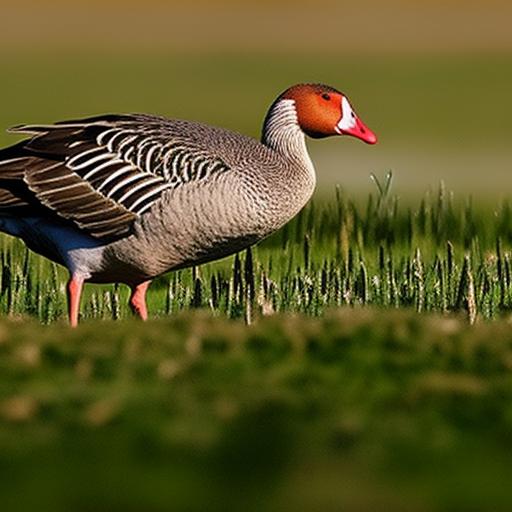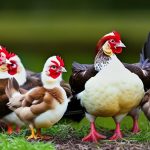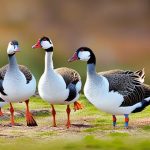Geese can be a significant nuisance for farmers and landowners, causing damage to crops and fields. They are attracted to fields with crops and grass for grazing, and their presence can result in reduced yields and financial losses. Therefore, finding effective ways to keep geese off fields is crucial for those who rely on their land for agricultural purposes.
Key Takeaways
- Geese can cause significant damage to crops on fields.
- Understanding the behavior of geese is crucial in finding effective solutions.
- Physical barriers, such as fences and netting, can keep geese off fields.
- Scaring geese away with noise and visual deterrents can be effective.
- Using trained dogs to chase geese off fields is a natural and humane option.
Understanding the behavior of geese
To effectively address the issue of geese on fields, it is important to understand their behavior. Geese are social animals that prefer open spaces near water. They are attracted to fields with crops and grass because they provide ample food sources for grazing. Additionally, geese are known to be territorial and will defend their chosen feeding grounds from other geese.
Physical barriers to keep geese off fields
One effective method of keeping geese off fields is through the use of physical barriers. Fencing and netting can be installed around the perimeter of the field to prevent geese from accessing the area. This method is particularly effective if the fence or netting is tall enough to deter the geese from attempting to fly over it.
Another option is the use of electric fencing, which can provide an additional deterrent for geese. When a goose comes into contact with the electric fence, it receives a mild electric shock, which discourages it from attempting to enter the field.
Scaring geese away with noise and visual deterrents
Scaring geese away with noise and visual deterrents can also be an effective method of keeping them off fields. Loud noises, such as propane cannons or bird distress calls, can startle geese and cause them to fly away. These devices can be set up around the perimeter of the field and activated at regular intervals to create a sense of danger for the geese.
Visual deterrents can also be effective in deterring geese from settling on fields. Scarecrows, reflective tape, and predator decoys can create the illusion of a threat and discourage geese from landing in the area. These visual deterrents should be moved regularly to prevent geese from becoming accustomed to their presence.
Using trained dogs to chase geese off fields
Another effective and humane method of keeping geese off fields is through the use of trained dogs. Border collies and other herding dogs can be trained to chase geese away from the field. The presence of a dog can create a sense of danger for the geese, causing them to fly away and seek a safer location.
It is important to note that the use of trained dogs should be done in a responsible and ethical manner. The dogs should be well-trained and under the control of their handler at all times. Additionally, it is important to avoid causing unnecessary stress or harm to the geese during the herding process.
Applying repellents and taste aversion techniques

Repellents can be applied to crops to deter geese from feeding on them. One commonly used repellent is Methyl Anthranilate, which is a non-toxic substance that creates an unpleasant taste and smell for geese. When applied to crops, it can discourage geese from feeding on them.
Taste aversion techniques can also be effective in deterring geese from settling on fields. Spraying crops with a bitter-tasting solution can make them unappealing to geese, causing them to seek alternative food sources.
Habitat modification to discourage geese from settling on fields
Modifying the habitat surrounding the field can also be an effective way to discourage geese from settling on it. Removing standing water and tall grass can make the area less attractive to geese, as they prefer open spaces near water. Additionally, planting crops that geese do not prefer can reduce their interest in the field.
Harvesting crops earlier to avoid attracting geese
Harvesting crops earlier than usual can help to avoid attracting geese to the field. Geese are attracted to fields with ripe crops, as they provide a plentiful food source. By harvesting the crops before they are fully ripe, the field becomes less attractive to geese, reducing the likelihood of damage and financial losses.
This method can also have the added benefit of increasing crop yields, as it allows for earlier harvesting and potentially reduces the risk of crop damage from other pests or adverse weather conditions.
Collaborating with neighboring landowners to manage geese populations
Managing geese populations can be a challenging task for individual landowners. However, by collaborating with neighboring landowners, it is possible to implement more effective and coordinated efforts to manage geese populations.
This can include coordinated hunting efforts, where landowners work together to control the number of geese in the area. Additionally, habitat modification efforts can be more effective when implemented on a larger scale, as they can create a less attractive environment for geese across multiple fields.
Finding the right approach to keep geese off fields
In conclusion, there are many effective methods for keeping geese off fields. The right approach will depend on the specific situation and needs of the landowner. Physical barriers, scaring geese away with noise and visual deterrents, using trained dogs, applying repellents and taste aversion techniques, habitat modification, harvesting crops earlier, and collaborating with neighboring landowners are all viable options.
It is important for farmers and landowners to assess their individual circumstances and choose the methods that will be most effective for their specific situation. By implementing these strategies, it is possible to reduce the damage caused by geese and protect valuable crops and fields.
If you’re struggling with keeping geese off your fields, you might find this article on Poultry Wizard helpful. It provides valuable insights and tips on how to effectively deter geese from invading your fields and causing damage. From understanding their behavior to implementing various deterrent methods, this article offers practical solutions to protect your crops. Check it out here for more information.
FAQs
What are the common problems caused by geese on fields?
Geese can cause damage to crops, contaminate water sources, and leave behind droppings that can spread disease.
What are some effective ways to keep geese off fields?
Some effective ways to keep geese off fields include using decoys, installing fencing, using noise deterrents, and planting unappealing vegetation.
What are some natural ways to keep geese off fields?
Some natural ways to keep geese off fields include using dogs, planting tall grasses, and using reflective surfaces.
What are some humane ways to keep geese off fields?
Some humane ways to keep geese off fields include using noise deterrents, using visual deterrents, and using motion-activated sprinklers.
What are some legal considerations when trying to keep geese off fields?
It is important to check with local and state laws before taking any action to keep geese off fields. Some species of geese may be protected by law, and certain methods of deterrence may be illegal.
Meet Walter, the feathered-friend fanatic of Florida! Nestled in the sunshine state, Walter struts through life with his feathered companions, clucking his way to happiness. With a coop that’s fancier than a five-star hotel, he’s the Don Juan of the chicken world. When he’s not teaching his hens to do the cha-cha, you’ll find him in a heated debate with his prized rooster, Sir Clucks-a-Lot. Walter’s poultry passion is no yolk; he’s the sunny-side-up guy you never knew you needed in your flock of friends!







